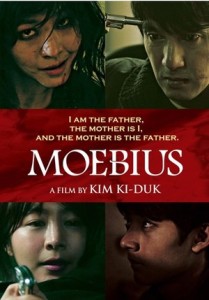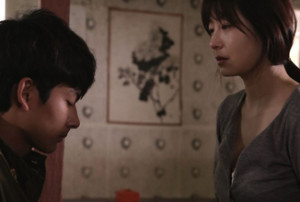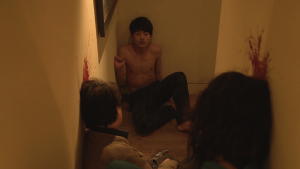 Controversial issues on film can be dealt with effectively in multiple ways. Not only do all genres – satire, tragedy, romance, etc. – function as powerful mediums to channel numerous points of view on a single topic, but literary devices like symbolism, myth cycles, and vocabulary play a pivotal role in structuring an issue. However, all these instruments employed in the making of a film should accomplish one major criterion for it to be successful – catharsis, or the release of emotions.
Controversial issues on film can be dealt with effectively in multiple ways. Not only do all genres – satire, tragedy, romance, etc. – function as powerful mediums to channel numerous points of view on a single topic, but literary devices like symbolism, myth cycles, and vocabulary play a pivotal role in structuring an issue. However, all these instruments employed in the making of a film should accomplish one major criterion for it to be successful – catharsis, or the release of emotions.
A Warning: Kim Ki-duk’s Moebius deals with incest, gang rape, castration and cannibalism. But it does not deal with catharsis, causing the movie to turn into a suffocating chamber of unthinkable, and most importantly, unidentifiable acts.
Moebius opens to a destroyed family. The Mother (Lee Eun-woo) sits disheveled and drunk on a flight of stairs, the Father (Jo Jae-hyeon) sits bored at an untidy desk and the Son (Seo Yeong-joo) is sullen and depressed while he prepares for school. The first disruption is caused by a phone call from the Father’s mistress – played by Lee Eun-woo herself – and a comical fight ensues between Mother and Father, ending with the Father shamelessly receiving the call. Starting here we are introduced to the phallic discourse – words and actions deriving meaning from the masculine point of view – as the Father engages in adultery. It is therefore, no wonder that the sole female figure in the entire movie is demonized – dark make-up, untidy green clothes symbolizing envy, hysterical. And then she does something which solidifies her image as the two-dimensional evil Mother – when her attempt to castrate her husband is foiled, she turns towards her son and castrates him.
A direct reference can be drawn to Euripides’ Medea where Medea murders her two children to punish her adulterous husband, Jason. By killing his heirs, she symbolically castrates him and puts an end to one lineage of patriarchy. As she flies off in her dragon chariot, Medea gains god-like proportions. But Kim Ki-duk is not going to allow it. Instead he shows a parody of Medea’s action. First, the Mother botches up the father’s castration implying that it is not a thoughtfully planned out act, then she castrates her son. But patriarchy is not synonymous to the penis. Patriarchy is an ideology, an oppressive institution of power and all she does is destroy the crown of the ideology – the penis – as she eats it up while the Father desperately tries to retrieve it. She does not kill patriarchy; she just severs it and that draws the ire of patriarchy introducing us to the Mistress. Female subjectivity ends at this point.
It is interesting to note that the Mistress is played by the mother herself. This is because she acts as the antithesis to the demonic mother. The Mistress is everything the Father would have liked the Mother to be. She is shy, docile, compliant to the Father’s sexual tendencies i.e., she is the patriarch’s approved amount of sexuality and femininity. Being a doll of male imagination, a castrated patriarchy also uses her as a punching bag to spend its anger on because dealing with the actual threat is not within their capacity.
 The enormous constructed importance of the penis in a man’s life is uncomfortably shown through the character of the Son. The penis is the symbol of power. If the vagina is the site of shame and ridicule, then the penis is the locus of male glory, which is why you have comparisons between penises sizes in popular discourse. The castrated Son has been uncrowned and the Father’s biggest concern is the Son’s sexual gratification. Sexual activity under heteronormative understanding is a means to gain male validation through subjugating women; the penis is the weapon of sexual pleasure and the son, devoid of one, faces the danger of being ousted by the patriarchal framework itself as is best reflected when he is bullied by his schoolmates, and later laughed at by his fellow rapists. Even the audience feels it funny when he is unable to urinate. The Son is no longer a man, he is a baby. He needs to retrieve his penis, both literally and metaphorically, and he embarks on that journey to its tragic ends.
The enormous constructed importance of the penis in a man’s life is uncomfortably shown through the character of the Son. The penis is the symbol of power. If the vagina is the site of shame and ridicule, then the penis is the locus of male glory, which is why you have comparisons between penises sizes in popular discourse. The castrated Son has been uncrowned and the Father’s biggest concern is the Son’s sexual gratification. Sexual activity under heteronormative understanding is a means to gain male validation through subjugating women; the penis is the weapon of sexual pleasure and the son, devoid of one, faces the danger of being ousted by the patriarchal framework itself as is best reflected when he is bullied by his schoolmates, and later laughed at by his fellow rapists. Even the audience feels it funny when he is unable to urinate. The Son is no longer a man, he is a baby. He needs to retrieve his penis, both literally and metaphorically, and he embarks on that journey to its tragic ends.
The lack of penis in the movie is first compensated for with phallic objects – revolvers, knives, golf club. Then the Son is initiated into the application of the power of the penis – seducing women. He tries to seduce his father’s Mistress, symbolically seducing his mother, and is thwarted. Later, when his new friends rape her he feels compelled to participate in the act because that is the only way to gain male validation, a pathetic attempt at reinstating himself into the patriarchal fold. To be able to force your will upon the female object is a matter of honour and prestige; it is a means to grow one’s metaphoric balls.
He is put in prison for his crime, the prison being a highly testosterone charged area, the confluence of sex and violence, and therefore, the stage of violent men. While he has gained the ticket into patriarchy, he is still not the man among men as he is molested by fellow rapists. Amongst men, he is a feminized figure, pretty much the female object and therefore, is acted upon.
 With the Father still searching means and ways of sexually gratifying his son, the viewer realizes the importance of phallic discourse captured in one pivotal line found on a site by the Father – “whole body is genital.” The implications are terrifying and hilarious because clearly the men are just walking penises now. The Son is advised by his father to rub himself with a stone until he bleeds which causes the male to ejaculate. The association of blood and pain is with female sexual experience, never with male sexual experience therefore, now both the Father and the Son are shown to us as feminized figures bearing the brunt of their own male ideology.
With the Father still searching means and ways of sexually gratifying his son, the viewer realizes the importance of phallic discourse captured in one pivotal line found on a site by the Father – “whole body is genital.” The implications are terrifying and hilarious because clearly the men are just walking penises now. The Son is advised by his father to rub himself with a stone until he bleeds which causes the male to ejaculate. The association of blood and pain is with female sexual experience, never with male sexual experience therefore, now both the Father and the Son are shown to us as feminized figures bearing the brunt of their own male ideology.
The artificial phalluses come back to the scene after the son is released. The woman, now an object without emotions or feelings, acts robotically providing sexual desires to whosoever. But her pleasuring of the feminized figure is disturbing. One of her rapists is also castrated in a joint attempt by the Son and her, and she pleasures them both by plunging a knife into their back and stroking it. There can be no doubt that the knife is the penis. Both, the ritual of the shared penis and the fact that the woman is a shared object between the Father and the son, and the rapist and the son creates a homosocial bonding between the men on the basis of a shared object which they keep on passing around.
 The knife is replaced by a donation of the Father’s penis to his son. It is a forceful and artificial reinstatement of manhood, and as expected the transition doesn’t go smoothly with the Son being unable to get an erection. By this time, the viewer is either overwhelmed by the gross and grotesque happenings or is dangerously desensitized so when he gets aroused by his Mother who in turn provides him a sexual release, the viewer can either lament or continue to watch without batting their eyelids. The Father finally fights his son; in fact he goes to castrate his son by cutting off his own penis planted on his son because his wife is not a shared object. The wife is his property, his territory and he becomes manically possessive of it especially because he has no penis anymore. He is insecure and blinded by rage when he sees his son paying back his gratitude by claiming his own property. He kills his wife and himself and the Son shoots his penis following his mother’s same flawed logic that it is the penis which is the root cause. The revolver – a phallic symbol – so far had been used only for foiled attempts. The father fails to shoot at his penis, he fails to kill himself but ironically, in the end, the ‘penis’ kills them all.
The knife is replaced by a donation of the Father’s penis to his son. It is a forceful and artificial reinstatement of manhood, and as expected the transition doesn’t go smoothly with the Son being unable to get an erection. By this time, the viewer is either overwhelmed by the gross and grotesque happenings or is dangerously desensitized so when he gets aroused by his Mother who in turn provides him a sexual release, the viewer can either lament or continue to watch without batting their eyelids. The Father finally fights his son; in fact he goes to castrate his son by cutting off his own penis planted on his son because his wife is not a shared object. The wife is his property, his territory and he becomes manically possessive of it especially because he has no penis anymore. He is insecure and blinded by rage when he sees his son paying back his gratitude by claiming his own property. He kills his wife and himself and the Son shoots his penis following his mother’s same flawed logic that it is the penis which is the root cause. The revolver – a phallic symbol – so far had been used only for foiled attempts. The father fails to shoot at his penis, he fails to kill himself but ironically, in the end, the ‘penis’ kills them all.
There are certain key elements in the movie, one being the absence of dialogues. The absence is unnerving because throughout the movie a tense silence is maintained. The shouts of pleasure blend into yells of pain and you cannot differentiate the good from the bad. It also rips the sole female character from her minimum agency since she is neither given a voice nor consequential acts. Despite, trying to portray her as the catastrophic decision maker it is easy to discern that she is powerless, almost an useless addition to the movie.
The second is the pervading gaze. Since they are no dialogues, sighting, looking, seeing, watching, glimpsing and gazing become important devices. The Son sights his Father having sex with the Mistress, the Mother looks at her Son masturbating, the Father stares at the Son severed penis, and we, the audience, gaze upon the unfolding of the monstrous event. It’s an uncomfortable feeling because the camera work always reminds us that we are eavesdropping, that our gaze is veiled, that we should not be watching this.
 The third one is the overarching theme of the movie – cycles—exemplified by the title itself. Moebius comes from “Moebius Strip” which is basically an endless loop, the loop which prevents any purging of emotions because you are just going to end up where you began no matter what you try. This pessimistic and, in my opinion, highly flawed message is shown in the cycles of the Mother’s and Father’s attempt at castration, the chopping off of the penis of the Son and the rapist, the parodies of Medea’s and Oedipus’ myth cycles and most significantly, by the ending of the movie. After castrating her son, the Mother leaves her home following a stranger – a parody of Medea seeking refuge at Aegeus ruled Athen – and this stranger is revealed to be the Son at the end. The Mother never escaped patriarchal folds; the incestuous end was already decided in the beginning.
The third one is the overarching theme of the movie – cycles—exemplified by the title itself. Moebius comes from “Moebius Strip” which is basically an endless loop, the loop which prevents any purging of emotions because you are just going to end up where you began no matter what you try. This pessimistic and, in my opinion, highly flawed message is shown in the cycles of the Mother’s and Father’s attempt at castration, the chopping off of the penis of the Son and the rapist, the parodies of Medea’s and Oedipus’ myth cycles and most significantly, by the ending of the movie. After castrating her son, the Mother leaves her home following a stranger – a parody of Medea seeking refuge at Aegeus ruled Athen – and this stranger is revealed to be the Son at the end. The Mother never escaped patriarchal folds; the incestuous end was already decided in the beginning.
This is not the most comprehensive review. The movie with the enormity of issues it deals with requires more than a single review. There are several religious symbolisms running throughout the movie which while may be the punch line of a dark joke – despite praying to and the presence of God there was no divine intervention – it could also mean a lot more things when seen within the ambit of Buddhist philosophy. This review is merely one section of the movie. However, no matter which way you approach it from, the end result will always be an assault on the mind without any remedy. It does not make you think, it makes you cringe. It makes you shield your eyes; it makes you want it to end as quickly as possible. Lack of closure can be dealt with but not a lack of catharsis.
This movie which is of men, by men and for men deserves a 3/5.
(Hangul Celluloid, Images via Next Entertainment World)


